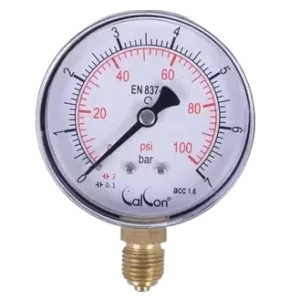Needle Valve
A needle valve is designed with a narrow port and a finely threaded, needle-like stem that enables accurate control of fluid flow. While typically suited for lower flow rates, it offers high precision in regulation. Available sizes range from ¼” to 2”, with threading options including BSP, NPT, and Autoclave.
Description
Needle valves are specialized devices that regulate fluid flow with exceptional precision. These valves use an extended, tapered stem that enables precise control, allowing operators to finely adjust the flow rate as needed. Their design makes them ideal for applications requiring accurate flow control in pipelines and equipment. Needle valves find common use in industries like oil & gas, chemical processing, pharmaceuticals, and instrumentation.
Key Features
- Precise Flow Control: The needle valve’s unique design lets operators fine-tune fluid flow, ensuring accurate regulation even at very low flow rates.
- Tapered Needle Design: The plunger’s tapered point enables precise control over the valve’s opening and closure.
- Durability: Constructed from high-quality materials such as stainless steel, needle valves withstand high-pressure and corrosive environments.
- Leak-Free Operation: Tight shut-off seals and low-flow control features prevent leaks, enhancing system safety.
- Compact Design: Their compact size makes needle valves suitable for installations in tight spaces or areas requiring precise flow adjustments.
Applications
Needle valves are used in various critical applications, including:
- Oil & Gas: Manage flow rates in pipelines, wellheads, and injection systems.
- Chemical Processing: Control chemical flows during production and reaction stages.
- Instrumentation: Play a vital role in laboratory and test environments where precise fluid control is essential.
- Pharmaceuticals: Regulate flow in mixing and dosage systems, ensuring exact measurements.
Benefits
- High Precision: These valves offer unmatched accuracy in flow control, especially for low-flow applications.
- Versatility: They perform well in both high- and low-pressure systems across different industries.
- Safe Operation: Their design minimizes the risk of leaks or unintended flow, ensuring safe system operation.
- Long Lifespan: Durable materials and advanced sealing mechanisms extend service life and reduce maintenance needs.
- Energy Efficiency: Precise fluid flow control helps optimize energy usage in industrial processes.
Conclusion
Needle valves play a crucial role in applications that demand accurate and controlled fluid flow. Their ability to manage flow rates with high accuracy makes them indispensable for applications in oil & gas, chemical processing, pharmaceuticals, and more. Whether for low-flow systems or high-pressure operations, needle valves provide exceptional performance and reliability, ensuring smooth and efficient system functionality.





